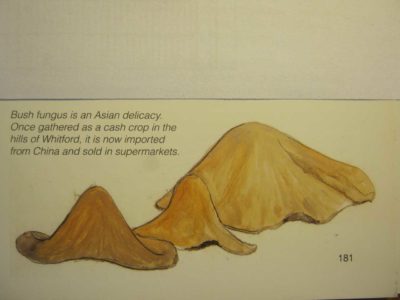
As Howick and districts count down to the 175th anniversary celebrations, the Times continues its series giving readers a glimpse of life as it used to be
By Alan La Roche
With no refrigeration, meat, butter, and cheese could be left in a bucket in the cold well-water. Cows or goats were milked daily but many foods needed to be preserved especially for cold winters.
Fencible families were often hungry. For a snack, children could pick cape-gooseberries and kawakawa berries or gather oysters off the rocks at the beach. Many foods were seasonal.
On the ships coming from Britain they had salted meats, ship’s biscuits, canned salmon, dried rice, barley and peas, preserved milk and dried potatoes.
At Howick, rats were a major problem so dried foods had to be in vermin-proof bins or tins. Indian corn and onions tops were tied and hung from the ceiling rafters away from rats.
Carrots and turnips were buried in soil near the cottage. Potatoes and kumara were kept dry and in the dark. Many Irish Fencibles in Howick used to lovingly share the kitchen for warmth at night with their animals including goats and hens until the 1980s.
Apples and pears could be placed on shelves or thinly sliced and hung on strings in the summer sun. Others soaked them in sugar in a slow oven and stored them in airtight tins. Some used to peel oranges or lemons in fine strips to dry in the sun then stored in tins.
Most Fencible families had hens or ducks and could wipe mutton fat over the eggs in a barrel of bran, small end downwards. Others placed eggs in lime-water or a salt solution. Grocers sold canned meats or fish in the 1850s.
Butter from Howick was wrapped in large cabbage leaves in boxes for Auckland grocers. This was an important income for Fencible families. Some salted butter was kept in barrels to improve its long-life.
Some families cut meat or fish into strips rubbed in salt then hung them in the chimney when there was a low-heat low-flame fire. Some dried eels from the local streams. A few families made their own hams or cured sausages in the chimneys.
Saltpetre and brine was used to preserve mutton. Meat was often hard to get due to the difficulties in keeping it fresh. Food poisoning from infected meat resulted in severe illness. A goat or a rooster made several meals for a family but if a cow was butchered it had to be consumed quickly by many families to avoid contamination.
Godwits were caught flying low over ridges using manuka branches or nets. Sparrows in oat stacks were also trapped in nets and put into hot water, feathers removed and gutted then boiled and put into ceramic pots where the fat formed a seal on the surface.
Brown paper with flour and water paste sealed these pots. The meat was later used in pies or stews. Godwits are now fully protected birds. One Whitford family claimed they subsisted by eating potatoes and preserved godwits.
Some Howick families gathered pigs-ear fungus off native trees in the bush which was dried and sold to Chinese merchants in Auckland or Otahuhu as another income. Other families sliced the fresh pig’s ear fungi and used them in stews. This fungus is now called “bush fungi” and is available in supermarkets.
Tea was the universal drink and was considered the “respectable drink” as it used boiled well water which was a safe drink.
But tea was relatively expensive so some Fencible wives were known for extracting every colour and taste out of the leaves then the leaves were dried and put in their clay pipes to smoke. As a tea substitute, dried young manuka leaves, dried kawakawa or piri piri [bidi bidi] leaves with hot water poured-over the leaves and a little honey made a pleasant drink.
It was the explorer Captain James Cook who called the Manuka bush “tea tree”.
Alan La Roche, Howick historian









